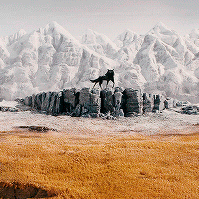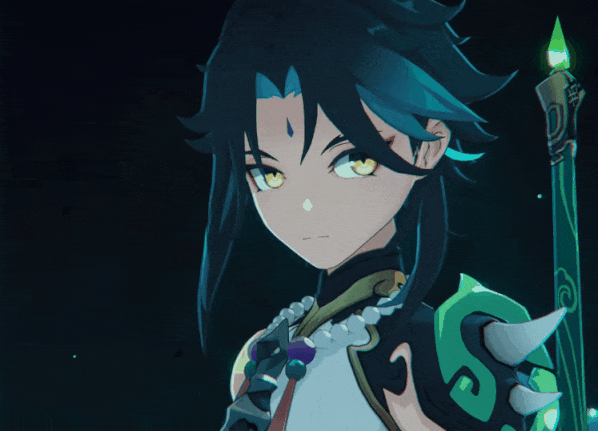elma harvey // three
Jan 9, 2017 7:08:55 GMT -5
Post by Onyx on Jan 9, 2017 7:08:55 GMT -5

elma harvey
seventeen
district three
They look at me, but they never see me, because they think I don't see them. I bet it was the first thing you saw, too. Wasn't it? Each green iris turned towards the other, like they're conspiring. A slight tremble in the muscles of the right one, especially when I'm thinking hard. Just enough to be offputting, isn't it? My father used to call me wild-eyes. He would sing to me, and nickname me in song. Jeepers creepers, where'd you get them peepers? He thought I liked it. Of course I didn't like it.
People don't notice how unblemished my skin is, and how much of my effort it takes to keep that way - nights of scrubbing my cheeks until they're red while I try desperately to ignore the reflection of a face I know will never be perfect. They don't notice the neat slope of my nose, the perfect oval of my lips. I'm charming in silhouette. In light, though, everyone keeps away.
When I was a girl, I grew my fringe so low it covered my eyes. I would peep through it, the world obscured by a curtain of brown curls, and hope that it would make a difference. Of course, I was naive then - now less so. Now I pull my long brown locks away from my face, and show myself off to the people around me. Let them stare. I challenge them to.
Some people thought it would make me quiet and shy. The doctors were worried when I didn't start talking as young as the other children that I might never talk at all. I spent long days then, as now, alone, but I loved my own company. No one could keep a secret better than I could, and I was amazed by my own talent for certain things as well. I had a knack for impersonations, and would often make myself laugh out loud simply by reeling off the voices of the people I knew. I never craved an audience, because I knew the price that would come with one. I was satisfied performing to myself.
Yet, I do speak, and have no problem expressing myself when I need to. My expectations of the people listening to me are just higher than otherwise. My parents, both manufacturers in a copper spooling factory (a much safer job than they could have ended up with, and we're all grateful), look at me with respect and talk to me the way everyone should; but even they make mistakes. So I've started assessing a criteria of my audience before I engage in conversation. I need my counterpart to have some piece of value to give back to me to make it worth me suffering the gazes and the self-consciousness that come with giving pieces of my mind to them.
More than talking, I play. When Klaus Goravich won and showed our generation we had some small chance of coming home alive, people started to abandon the things they loved in favour of practising something with some advantage. In a District overflowing with creative minds, art projects were cast aside, blueprints rolled up and locked away, performances delayed and, eventually, cancelled. My schoolmates all enrolled in the specialised electrical colleges, hoping they could understand the technology that powers the Games and it might give them some advantage over the predatorial precision of the higher Districts. I had no interest in that. I simply followed in their wake and chose what I wanted from the junk pile.
It took months of testing and trying different skills before I found what fit me best. When I first saw the harp, dusty and untuned in an empty room in our school building, I didn't even know that was what it was called. There was something so magnificent about finding such a rare treasure, not out of selfishness but with a sense that I could treat it the way it deserved to be treated. A sense of justice. Unlike other instruments, which can be mastered quickly and then simply perfected, my treasure took dedication and determination. Learning was intimate. I got to know the harp better than any person could ever know another.
The other feature I found so liberating was how well I became in tune with my sense of touch. The different rhythms of vibrations in the strings were as delicate as bird bones - if you pried too hard to find them you'd end up breaking them irredeemably. It took precision, and often I would get too frustrated, my usually steady nerve snapping and isolating me from the instrument for weeks at a time. But with patience, more patience than I ever thought I had in me - a skill I acquired from that exercise rather than from my life experiences - I could put all of my mind into my fingers, and recognise a string simply by its tone and its vibrations against my gently calloused fingertips.
And when I had it, oh, I had it. I could close my eyes and the trembling strings were just more of me. I had power over the melodies I never had over people, and it was redeeming. And then it was more than the strings. Placing my hands over my pale rib cage and feeling the thrumming of my fragile heart, I could imagine which note it would make, too. The winds would whistle through the house and I could picture the tiny threads of every fibre humming in unison. I had discovered something extraordinary, something so separate from my vision, my eyes, that had done nothing but hinder me my whole life.
The redemption that came with my power was overwhelming. I suddenly had a new love for the natural world around me, though the people in it still gave me grief. Instead of downturning my eyes and avoiding attention, I kept them turned up to the skies and ignored it. Still, at my core, I have stayed the same - judging people before I speak to them, keeping my secrets between myself and me. But now I am filled up with awe and joy for life. The music of it is inside and around me, and as a part of it, I will make sure to never lose it.





























































